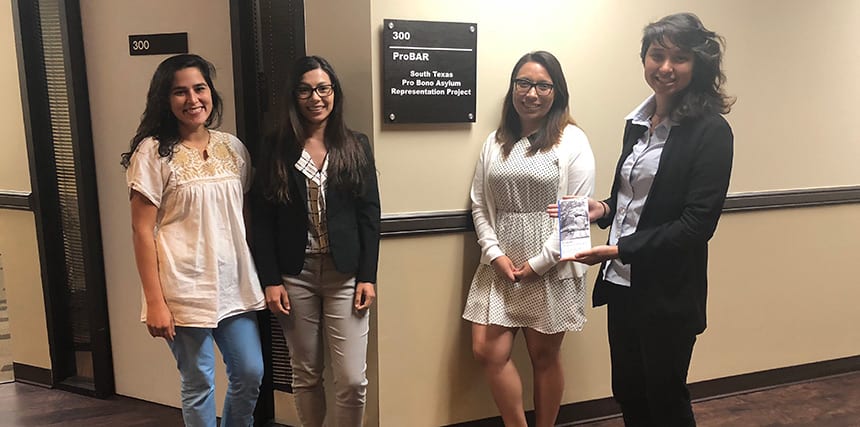
By Andrew Cohen
Four Berkeley Law students recently spent a week in Brownsville, Texas, helping detained immigrants at the United States-Mexico border.
Working on behalf of the South Texas Pro Bono Asylum Representation Project (ProBAR), Brenda Munoz ’19, Kiki Tapiero ’20, Elvia Lopez ’19, and Katie Gonzalez ’19 conducted intakes with immigrants at the Port Isabel Detention Center and provided strategic guidance. The school’s Pro Bono Program coordinated the trip, made possible by a gift from Abe Friedman ’98 and Jennifer Mathews Friedman ’97 in response to the border’s family separation crisis.
“Most of our work involved providing legal information and orientation about their rights while in detention,” Munoz says. “Specifically, we explained the process for them to be released on bond or parole in order to fight their cases from the outside with their families. We also gave them information about the asylum process and other types of relief for which they might qualify.”
ProBAR recruits, trains, and coordinates the activities of volunteer attorneys, law students, and legal assistants. The organization is a joint project of the American Bar Association, State Bar of Texas, and American Immigration Lawyers Association.
The intensive work proved both gratifying and emotionally draining for the Berkeley Law students—each raised by immigrant parents.
“That connection made it all the more difficult to see so many detained migrants lined up in jumpsuits and speaking to their children separated by glass panes,” Lopez says. “In the face of increasing criminalization of immigrants, I was inspired to witness their profound resilience.”
Frustration and inspiration
The students were particularly moved by the youth transferred from unaccompanied minor shelters to adult detention.
“These young boys had experienced severe persecution, yet so many exemplified a strong will to live, a hope for a better life and, sometimes, even a lightheartedness that left me in awe,” says Lopez, who marveled at their “extraordinary perseverance.”
The Pro Bono Program enlisted ProBAR Equal Justice Works fellow and Berkeley Law alumna Natalie Cadwalader-Schultheis ’17 to oversee the students’ work. She provided an overview of asylum law and other legal tasks that Munoz, Tapiero, Lopez, and Gonzalez performed, allowing them to take on full responsibility of cases under her supervision.
“Natalie reviewed our work and carved out time to consult with us when we needed more guidance,” Gonzalez says. “Her structure allowed us to learn asylum law quickly. We got hands-on experience in interviewing clients, gathering bond or parole documents, drafting asylum applications, drafting declarations, and beginning the asylum brief research.”
Among the myths surrounding immigration, Tapiero believes, is the presumption that white people at the border who harbor racial animus are mainly driving family separations. She notes that many border cities are more than 90 percent Latinx.
“That means it’s often Latinx folks working at the border, in detention centers, and patrolling the interior, at least in that area,” says Tapiero, who helps lead the Berkeley Immigration Group. “They often have to take those jobs because they’re stable, government-paying jobs that offer enticing benefits in cities where only a minority of their residents hold bachelor degrees. We must question and transform the systems that allow for these inequalities in wealth to happen, and address the internalized racism within ourselves and our communities, because they lead to tangible and harmful consequences.”